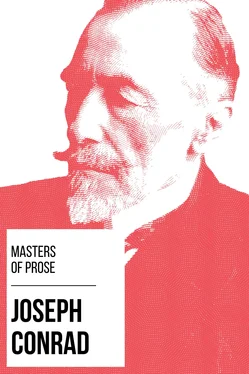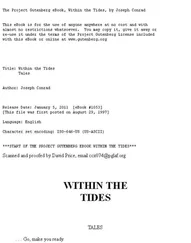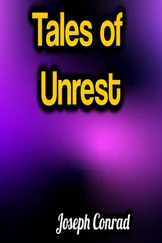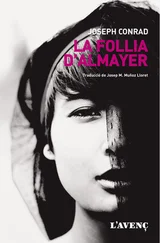He was a man of strange contradictions. Living for many years in his brother's house, the home of many children, a house full of life, of animation, noisy with a constant coming and going of many guests, he kept his habits of solitude and silence. Considered as obstinately secretive in all his purposes, he was in reality the victim of a most painful irresolution in all matters of civil life. Under his taciturn, phlegmatic behaviour was hidden a faculty of short-lived passionate anger. I suspect he had no talent for narrative; but it seemed to afford him sombre satisfaction to declare that he was the last man to ride over the bridge of the river Elster after the battle of Leipsic. Lest some construction favourable to his valour should be put on the fact he condescended to explain how it came to pass. It seems that shortly after the retreat began he was sent back to the town where some divisions of the French army (and among them the Polish corps of Prince Joseph Poniatowski), jammed hopelessly in the streets, were being simply exterminated by the troops of the Allied Powers. When asked what it was like in there, Mr. Nicholas B. muttered only the word “Shambles.” Having delivered his message to the Prince he hastened away at once to render an account of his mission to the superior who had sent him. By that time the advance of the enemy had enveloped the town, and he was shot at from houses and chased all the way to the river-bank by a disorderly mob of Austrian Dragoons and Prussian Hussars. The bridge had been mined early in the morning, and his opinion was that the sight of the horsemen converging from many sides in the pursuit of his person alarmed the officer in command of the sappers and caused the premature firing of the charges. He had not gone more than two hundred yards on the other side when he heard the sound of the fatal explosions. Mr. Nicholas B. concluded his bald narrative with the word “Imbecile,” uttered with the utmost deliberation. It testified to his indignation at the loss of so many thousands of lives. But his phlegmatic physiognomy lighted up when he spoke of his only wound, with something resembling satisfaction. You will see that there was some reason for it when you learn that he was wounded in the heel. “Like his Majesty the Emperor Napoleon himself,” he reminded his hearers, with assumed indifference. There can be no doubt that the indifference was assumed, if one thinks what a very distinguished sort of wound it was. In all the history of warfare there are, I believe, only three warriors publicly known to have been wounded in the heel—Achilles and Napoleon—demigods indeed—to whom the familial piety of an unworthy descendant adds the name of the simple mortal, Nicholas B.
The Hundred Days found Mr. Nicholas B. staying with a distant relative of ours, owner of a small estate in Galicia. How he got there across the breadth of an armed Europe, and after what adventures, I am afraid will never be known now. All his papers were destroyed shortly before his death; but if there was among them, as he affirmed, a concise record of his life, then I am pretty sure it did not take up more than a half sheet of foolscap or so. This relative of ours happened to be an Austrian officer who had left the service after the battle of Austerlitz. Unlike Mr. Nicholas B., who concealed his decorations, he liked to display his honourable discharge in which he was mentioned as un schreckbar (fearless) before the enemy. No conjunction could seem more unpromising, yet it stands in the family tradition that these two got on very well together in their rural solitude.
When asked whether he had not been sorely tempted during the Hundred Days to make his way again to France and join the service of his beloved Emperor, Mr. Nicholas B. used to mutter: “No money. No horse. Too far to walk.”
The fall of Napoleon and the ruin of national hopes affected adversely the character of Mr. Nicholas B. He shrank from returning to his province. But for that there was also another reason. Mr. Nicholas B. and his brother—my maternal grand father—had lost their father early, while they were quite children. Their mother, young still and left very well off, married again a man of great charm and of an amiable disposition, but without a penny. He turned out an affectionate and careful stepfather; it was unfortunate, though, that while directing the boys' education and forming their character by wise counsel, he did his best to get hold of the fortune by buying and selling land in his own name and investing capital in such a manner as to cover up the traces of the real ownership. It seems that such practices can be successful if one is charming enough to dazzle one's own wife permanently, and brave enough to defy the vain terrors of public opinion. The critical time came when the elder of the boys on attaining his majority, in the year 1811, asked for the accounts and some part at least of the inheritance to begin life upon. It was then that the stepfather declared with calm finality that there were no accounts to render and no property to inherit. The whole fortune was his very own. He was very good-natured about the young man's misapprehension of the true state of affairs, but, of course, felt obliged to maintain his position firmly. Old friends came and went busily, voluntary mediators appeared travelling on most horrible roads from the most distant corners of the three provinces; and the Marshal of the Nobility (ex-officio guardian of all well-born orphans) called a meeting of landowners to “ascertain in a friendly way how the misunderstanding between X and his stepsons had arisen and devise proper measures to remove the same.” A deputation to that effect visited X, who treated them to excellent wines, but absolutely refused his ear to their remonstrances. As to the proposals for arbitration he simply laughed at them; yet the whole province must have been aware that fourteen years before, when he married the widow, all his visible fortune consisted (apart from his social qualities) in a smart four-horse turnout with two servants, with whom he went about visiting from house to house; and as to any funds he might have possessed at that time their existence could only be inferred from the fact that he was very punctual in settling his modest losses at cards. But by the magic power of stubborn and constant assertion, there were found presently, here and there, people who mumbled that surely “there must be some thing in it.” However, on his next name-day (which he used to celebrate by a great three days' shooting party), of all the invited crowd only two guests turned up, distant neighbours of no importance; one notoriously a fool, and the other a very pious and honest person, but such a passionate lover of the gun that on his own confession he could not have refused an invitation to a shooting party from the devil himself. X met this manifestation of public opinion with the serenity of an unstained conscience. He refused to be crushed. Yet he must have been a man of deep feeling, because, when his wife took openly the part of her children, he lost his beautiful tranquillity, proclaimed himself heartbroken, and drove her out of the house, neglecting in his grief to give her enough time to pack her trunks.
This was the beginning of a lawsuit, an abominable marvel of chicane, which by the use of every legal subterfuge was made to last for many years. It was also the occasion for a display of much kindness and sympathy. All the neighbouring houses flew open for the reception of the homeless. Neither legal aid nor material assistance in the prosecution of the suit was ever wanting. X, on his side, went about shedding tears publicly over his stepchildren's ingratitude and his wife's blind infatuation; but as at the same time he displayed great cleverness in the art of concealing material documents (he was even suspected of having burned a lot of historically interesting family papers) this scandalous litigation had to be ended by a compromise lest worse should befall. It was settled finally by a surrender, out of the disputed estate, in full satisfaction of all claims, of two villages with the names of which I do not intend to trouble my readers. After this lame and impotent conclusion neither the wife nor the stepsons had anything to say to the man who had presented the world with such a successful example of self-help based on character, determination, and industry; and my great-grandmother, her health completely broken down, died a couple of years later in Carlsbad. Legally secured by a decree in the possession of his plunder, X regained his wonted serenity, and went on living in the neighbourhood in a comfortable style and in apparent peace of mind. His big shoots were fairly well attended again. He was never tired of assuring people that he bore no grudge for what was past; he protested loudly of his constant affection for his wife and stepchildren. It was true, he said, that they had tried to strip him as naked as a Turkish saint in the decline of his days; and because he had defended himself from spoliation, as anybody else in his place would have done, they had abandoned him now to the horrors of a solitary old age. Nevertheless, his love for them survived these cruel blows.
Читать дальше












